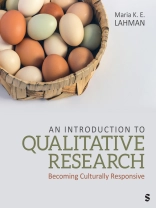This engaging introduction to all aspects of qualitative research challenges students to consider how their research can be culturally responsive. The first part of the book introduces the foundations including theory, ethics, and reflexivity, with an emphasis on multiple methodologies, from traditional to critical and cutting-edge. The second part covers practical guidance from writing proposals to data collection, and includes a chapter dedicated to creating a culturally responsive relationship with research participants. Finally, readers engage with how the quality of research is enhanced, how data are analyzed, and how research accounts are created and disseminated. Areas vital to the health of qualitative research are addressed including systemic racism and cultural humility, with cutting-edge suggestions offered in areas like hybrid research, harnessing technology, and use of social media. Multiple identities are centered in examples throughout including race, gender, and those who are hard to reach or seldom heard in research. Textboxes featuring scholars, student researchers, and community members invite readers into dialogue in an area that is contested, swiftly shifting, and always vibrant with potential.
Resources for instructors are available on a website to accompany the book.
Innehållsförteckning
Part One: Foundations of Qualitative Research
Introduction: Introducing Qualitative Research in a Culturally Responsive Context
Chapter One: What is Culturally Responsive Qualitative Research?
Chapter Two: Reflexivity, Ethics, & Theory—Foundations of Qualitative Research
Chapter Three: Qualitative Research Methodologies
Chapter Four: Exemplars of Qualitative Research
Chapter Five: Proposing Qualitative Research—Literature Review, Research Questions, Research Design
Chapter Six: Research Participants
Part Two: Data Collection
Chapter Seven: Observation
Chapter Eight: Interviews
Chapter Nine: Material Data
Part Three: Making the Most of Research Data, Rigor, and Representation
Chapter Ten: Enhancing Trustworthiness
Chapter Eleven: Analyzing Qualitative Data
Chapter Twelve: Writing, Representing & Publishing and Promoting Research Accounts
Om författaren
Maria K. E. Lahman is a professor of qualitative methodology at the University of Northern Colorado, in Colorado, USA. She is the author of the Sage textbooks Ethics in Social Science Research: Becoming Culturally Responsive and Writing and Representing Qualitative Research. A Mennonite, Maria challenges herself to weave aspects of social justice and peacebuilding into her pedagogy and scholarship. Maria′s scholarship is focused on creating ethical solutions for culturally complex methodological situations, diversity, young children, mothering, and qualitative writing representation.












